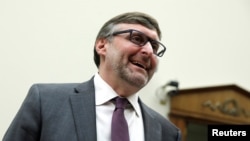The White House is expanding and expediting efforts to restart Serbia-Kosovo normalization talks as part of a broader campaign to integrate the Balkans into the Euro-Atlantic community, according to the top U.S. diplomat to the region.
"With negotiations at a standstill, both [Serbia and Kosovo] risk squandering the best chance in a generation to normalize relations and move towards a more secure and prosperous future," said Matthew Palmer, the U.S. special envoy to the western Balkans. He recently testified before the Senate Foreign Relations Subcommittee on Europe and Regional Security Cooperation.
In his first public statements since the White House announced the appointment of a dedicated special envoy for Serbia-Kosovo negotiations — a new part-time position to be occupied by Richard Grenell, U.S. ambassador to Germany — Palmer, who for months had been calling for talks to be jump-started, welcomed the diplomatic backup.
"Together, Ambassador Grenell and I will work towards helping the parties reach a comprehensive agreement on normalization," said Palmer. "With enhanced political engagement as well as the pursuit of business and commercial incentives, we will endeavor to help the parties themselves find a locally-owned agreement that is durable, implementable, and increases regional stability."
Calling the new diplomatic strategy "more like a partnership, not a division of responsibilities," Palmer said Grenell has been tasked with pushing both Serb and Kosovar parties to move quickly.
"Right now they have the attention of the White House, they have the full focus not just of the administration, but of the president," he said. "That's a very useful tool, and that's not forever. And to take advantage of that, the parties need to demonstrate that they are prepared to move on an expedited basis to actually reach some agreement."
Palmer also pointed to a recent European Council decision to reject EU membership negotiations for North Macedonia and Albania as a sobering warning, however, that even the most robust efforts to negotiate normalization settlements — a prerequisite for joining the 28-nation bloc — can prove futile.
"These are EU-led negotiations; the U.S. doesn't have a formal role in a dialogue process itself," he said. "That's why the decision by the European Council not to open accession negotiations with North Macedonia and Albania was so disheartening — because it sends exactly the wrong message to both Belgrade and Pristina. That message is, 'You can do difficult things; you can make hard choices; you can compromise, and you can still be denied a path forward to Europe.'"
France led the group of EU member nations that opposed starting membership talks for North Macedonia and Albania, with President Emmanuel Macron stating that although both countries made solid progress on various reforms, "some areas, such as immigration, needed more work."
"The enlargement rules need reform," Macron later said at a press conference. "We mustn't open accession talks with North Macedonia before Albania — there must be a majority for talks with both, together. We should do more to help those countries develop, not just make pledges."
Unexpected appointment
Palmer said Grenell's dedicated focus on Serbia-Kosovo talks alone will complement his own ongoing work across the western Balkans region and strengthen U.S. political commitments on the ground.
"It is our hope this more robust approach that highlights the economic benefits of progress will help encourage Belgrade and Pristina to find a political settlement," he said.
A former Serbian province, Kosovo declared independence in 2008.
The country is recognized by most of the Western world, but Serbia and allies China and Russia do not, effectively shutting it out of the United Nations.
In addition to his role as special envoy to the western Balkans, Palmer, a career Foreign Service officer, continues to serve as deputy assistant secretary in the Bureau of European and Eurasian Affairs. It is a position he has held since 2018.
Grenell, 53, will act in his new role in conjunction with his current post as ambassador to Berlin. He has held that job since April 2018.
Republican Senator Ron Johnson of Wisconsin, who chairs the European subcommittee, told VOA's Serbian service that he had spoken with both diplomats, and that they have a shared plan for restarting talks.
"I know that they have a plan, the first focus of which is on economic chances," he said. "I think they can achieve something there and then try to get both parties back to work together, and we support them."
This story originated in VOA's Serbian service.




